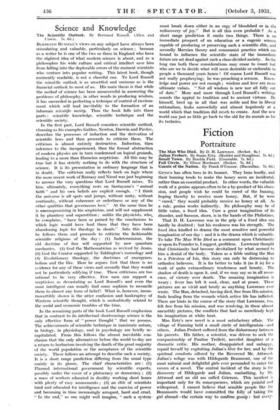Science and Knowledge
BERTRAND RUSSELL'S views on any subject have always been stimulating and valuable, particidarly on science ; because
as a writer he is one of the two or three in England who have the slightest idea of what modern science is about, and as a philosopher his wide culture and critical intellect save him from falling into the deplorable errors of the eminent scientists who venture into popular writing. This latest book, though eminently readable, is not a cheerful one. To Lord Russell
the scientific outlook is as unsettled and ominous as is the financial outlook to most of us. His main thesis is that while the method of science has been unsuccessful in answering the problems of philosophy, in other words in producing wisdom, it has succeeded in perfecting a technique of control of environ- ment which will lead inevitably to the formation of an inhuman scientific society. Thus the book falls into three parts : scientific knowledge, scientific technique and the scientific society.
In the first part, Lord Russell considers scientific method, choosing as his examples Galileo, Newton, Darwin and Pavlov, describes the processes of induction and the derivation of scientific laws and then proceeds to criticize them. The criticism is almost entirely destructive. Induction, then inference to the inexperienced, then the formal abstraction of modern physics are in turn condemned on logical groUnds, leading to a more than Humeian scepticism. All this may be true but it has strictly nothing to do with the structure of science. It is its presentation in ordinary language that is in doubt. The criticism really reflects back on logic where the more recent work of Ramsay and Nicod was just beginning to answer the very questions that Lord Russell raises. To him, ultimately, everything rests on Santayana's " animal faith " and his own beliefs are explicit enough. " I think the universe is all spots and jumps, without unity, without continuity, without coherence or orderliness or any of. the other qualities that governesses love." At the same time he is uncompromising in his scepticism, and will not supplement it by phantasy and superstition ; unlike the physicists; who, he complains, " have been so pained by the conclusions to which logic would have lead them that they have been abandoning logic for theology in shoals." Into this realm he follows them and proceeds to criticize the fashionable scientific religions of the day : (1) Indeterminism, the old doctrine of free will supported by new quantum mechanics. • (2) God the Mathematician as revived by Jeans.
(3) God the Creator supported by Eddington's cosmology and (4) Evolutionary theology, the doctrines of emergence, holism and the like. Here he argues first that there is no evidence for any of these views and secondly that they would not be particularly edifying if true. These criticisms are too rational to be very effective. Few men can support a scepticism as devastating as Lord Russell's and even the most intelligent can usually find some sophism to reconcile them to almost any form of belief! What is, however, incon- trovertibly shown is the utter confusion and bankruptcy of Western scientific thought, which is undoubtedly related to the social and economic troubles of the time.
In the remaining parts of the book Lord Russell emphasizes that in contrast to its intellectual shortcomings science is the only effective form of " power thought " that we possess. The achievements _of scientific technique in inanimate nature, in biology. in physiology, and in psychology are briefly re- capitulated. From this follows the almost inevitable con- clusion that the only alternatives before the world to-day are a return to barbarism involving the death of the great majority of the world population or the acceptance of the scientific society. There follows an attempt to describe such a society. It is a short range prediction differing from the usual type mainly in its gloom. The chief characteristics are : (1) Planned international government by scientific experts, possibly under the cover of a plutocracy or democracy ; (2) a mass of workers educated in docility working short hours with plenty of easy amusements ; (3) an elite of scientists bred and educated for intelligence and the exercise of power and becoming in time increasingly arrogant, hard and cruel. " In the end," as one might well imagine, " such a system • must break down either in an orgy of bloodshed or in the rediscovery of joy." But is all this even probable ? As a short range prediction it omits two things. There is no immediate prospect of an education or a eugenic science capable of producing or preserving such a scientific elite, and secondly Marxian theory and communist practice which are bound to influence the scientific state of the immediate future are set dead against such a class-divided society. In the long run both these considerations may cease to count but who are we to decide what will seem desirable or endurable to people a thousand years hence ? Of course Lord Russell was not really prophesying; he was preaching a sermon. Know- ledge and power are not enough ; wisdom and love are more ultimate values. " Not all wisdom is new nor all folly out of date." More and more through Lord Russell's writings sounds the appial to tradition and to ancient virtues. He himself, bred up in all that was noble and fine in liberal rationalism, looks sorrowfully and almost hopelessly at a world which that tradition did much to create. And the new world can just as little go back to the old for its morals as for its technics.










































 Previous page
Previous page